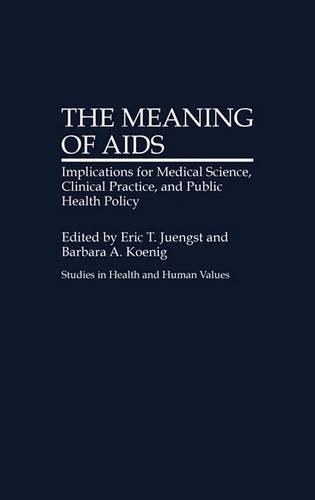
The Meaning of AIDS: Implications for Medical Science, Clinical Practice, and Public Health Policy
(Hardback)
Publishing Details
The Meaning of AIDS: Implications for Medical Science, Clinical Practice, and Public Health Policy
By (Author) Eric T. Juengst
Edited by Barbara A. Koenig
Bloomsbury Publishing PLC
Praeger Publishers Inc
16th February 1989
United States
Classifications
Tertiary Education
Non Fiction
Health systems and services
362.1042
Physical Properties
Hardback
218
Description
The editors of this remarkable volume have collected 18 essays by humanists about Acquired Immune Deficiency Syndrome. AIDS seems to seek out as its victims the weakest and already victimized, writes Albert R. Jonsen, describing the inhumanity of this disease. Jonsen states that scientists have already fashioned a language for describing the disease in objective, clinical terms. What is needed now is a language to describe the human experience and instruct us on how to live humanely while AIDS is among us. To help construct this language, this collection examines AIDS from the perspective of the humanities: History can recall past experience for our instruction, Philosophy can define terms such as welfare, freedom, health, and disease, that guide our discourse, and Literature can reveal the images that shape the social reality of AIDS. Editors Eric T. Juengst and Barbara Koenig begin this study by delineating six interpretations of AIDS. Their aim is to demonstrate the many ways in which AIDS is viewed by society. The book is then divided into three parts. Part One examines how our current knowledge of AIDS was generated and how this knowledge is interpreted. Part Two explores the meaning of AIDS for health professionals and the ethical issues it can raise. Part Three examines public policy and AIDS. The contributors clarify and correct definitions, recall analogous incidents in our history and draw values and principles out of the obscurity of emotions and into the light of reason. divided into three parts. Part One examines the current knowledge of AIDS and how this knowledge is interpreted. Part Two explores the meaning and perceptions of AIDS in the medical community. Part Three examines public policy and AIDS. The contributors clarify and correct definitions, recall analogous incidents in our history and draw values and principles out of the obscurity of emotion and into the light of reason.
Reviews
This collection of essays examines AIDS from a multidisciplinary perspective. Contributors focus on how prevailing perceptions and visions of AIDS as a disease entity, an illness experience, a contagious infection, a fatal affliction, an epidemic disease, and a challenge to individual liberty have come to elicit the current personal, medical, social, and political responses to it. As with several current books on AIDS, this work originated as contributions to a 1986 conference. The book is organized into three parts, each containing six chapters. Part 1 examines the extent to which objective knowledge about AIDS as a disease and the subjective experience of it as an illness are intertwined and have influenced the prevailing cultural notions of the disease. Part 2 focuses on how these very perceptions have come to bear on and become problematic in the delivery of medical care to AIDS patients. Part 3 describes how cultural notions about AIDS have influenced the ethical, legal, and public policy issues confronted in dealing with a major public health problem while attempting to circumvent the potential dangers of discriminatory and coercive control measures. This is an intelligent, thoughtful, and readable book that presents a cogent analysis of the humane factors of this much dreaded problem. The editors and contributors successfully present salient and provocative concepts on a matter of considerable current concern. Academic and public library collections.-Choice
"This collection of essays examines AIDS from a multidisciplinary perspective. Contributors focus on how prevailing perceptions and visions of AIDS as a disease entity, an illness experience, a contagious infection, a fatal affliction, an epidemic disease, and a challenge to individual liberty have come to elicit the current personal, medical, social, and political responses to it. As with several current books on AIDS, this work originated as contributions to a 1986 conference. The book is organized into three parts, each containing six chapters. Part 1 examines the extent to which objective knowledge about AIDS as a disease and the subjective experience of it as an illness are intertwined and have influenced the prevailing cultural notions of the disease. Part 2 focuses on how these very perceptions have come to bear on and become problematic in the delivery of medical care to AIDS patients. Part 3 describes how cultural notions about AIDS have influenced the ethical, legal, and public policy issues confronted in dealing with a major public health problem while attempting to circumvent the potential dangers of discriminatory and coercive control measures. This is an intelligent, thoughtful, and readable book that presents a cogent analysis of the humane factors of this much dreaded problem. The editors and contributors successfully present salient and provocative concepts on a matter of considerable current concern. Academic and public library collections."-Choice
Author Bio
ERIC T. JUENGST is Assistant Professor of Humanities (Philosophy), Department of Humanities, Pennsylvania State University College of Medicine, Milton S. Hershey Medical Center, Hershey, Pennsylvania. BARBARA KOENIG is Nursing Education Coordinator, AIDS Professional Education Project and Adjunct Lecturer, Division of Medical Ethics, University of California-San Francisco, San Francisco, California.
